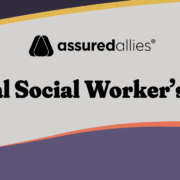How to Win the Hiring War
Michal Shahal brings 25 years experience to her new position as VP of Human Resources at Assured Allies, an insuretech start-up that completed an $18.3M Series A funding round in July 2021 and is currently on track to more than double its current staff by the end of 2022. She recently spent an hour on Zoom, the brilliant Tel Aviv skyline behind her, to share ideas about how HR can navigate recruitment and retention in today’s tough labor market and how she is already beginning to pivot in anticipation of more changes to come.
 Assured Allies increased staff by 10% last week. Surely that’s a record for Assured Allies and impressive for any company in today’s labor market. How did you do it?
Assured Allies increased staff by 10% last week. Surely that’s a record for Assured Allies and impressive for any company in today’s labor market. How did you do it?
My heart goes out to everyone. We are all in the same boat. There’s a war for talent. And it is true what they say, that post Covid the world of work has changed. I have always been a freak of data and of learning from smart people in my domain, so during the first few months of Covid, being locked up in my home, I searched for words of wisdom from seasoned HR professionals. I came across a super smart guy – Steve Cadigan, First Chief HR Officer for LinkedIn and author of a book called “Workquake.” Covid has indeed caused a “work quake,” and Cadigan was one of the first to notice that job seekers today care first and foremost about finding meaningful work. Happily, our company’s mission to support successful aging is just that. There’s not one person whom I talk to about my new job whose ears don’t perk up and go Huh! Tell me more.
Secondly, sell your company’s uniqueness or edge. We get a lot of traction from candidates because of the “twist” in mindset around aging and how there is a way to tackle it from a different angle. We have a very unique value proposition. Helping people age in place by adding a wellness component to long-term care insurance is a domain that is not flooded with competitors, so it is relatively easy for us to brand and position ourselves.
Last but not least, put your best people out there to interview candidates. Leverage your existing leaders and subject matter experts to sell themselves. Candidates choose us for our mission but also for our people. They want to work for people who will respect them, listen, and care. We are very diligent about the soft skills of the people we hire — in addition to skills and experience, we look for people who are soft at the edges, open minded, and creative: the qualities we want our company to project to others.
That sounds a lot like marketing.
Yes! In 2021, you want each employee to exercise their marketing muscles. I urge our people to leverage daily conversations to talk about the company. The lady in the supermarket, my neighbor, my mom’s best friend, my daughter’s best friend’s dad — I talk to everyone as I never know who will spread the word around. We are all ambassadors of Assured. Candidates who don’t end up working for our company, are likely to talk about Assured Allies with their friends, family, parents, and kids. One of our sales channels is our candidates.
Speaking of interviewing, do you have any tips for doing it remotely?
You only have one hour to build trust, to listen with intent to what you’re being told — and what you’re not being told — and to try and observe body language on Zoom. It’s challenging. One way to broker open communication and trust is to expose your own vulnerability. For example, when I start interviewing I say, “Here’s a disclaimer: I’ve only been with the company for two months. My perspective, therefore, is all very fresh.” The fact that I’m a newcomer makes people feel closer as we have something in common. It often triggers a conversation on why did I choose to work here, what do I like about the culture? I put myself out there in the interview and candor from my end inspires the same from the candidate. Start-ups can be demanding at times, so I emphasize how I prioritize work-life balance for my own wellness. I talk about how we are passionate and opinionated – and how that sometimes causes clashes, which in my mind, is the beauty of working in a fast-paced, multi-functional company. We move fast; not everyone can handle it well.
In short, when interviewing remotely, you, as the interviewer, need to work harder on projecting the company culture into a Zoom screen. There’s no other context — no office space to show around, no coffee machine, no faces that the candidate meets when he/she sits in the lobby to wait for the interview. Just a one man/woman, one-hour show on videochat.
How does Assured Allies support diversity?
I came from a company [Dell EMC] where the vast majority of the employees were engineers. At Assured Allies, due to the nature of what we do, there are engineers, actuaries, marketers, social workers, a neuroscientist, and an occupational therapist. All of these people in one room: that’s innovation! And we are multicultural by definition as we operate in cities across two countries, U.S. and Israel. Until last week’s hires we were 51% women. Now we are 49% but we will fix that.
I can honestly say that upon hire – I was puzzled by how everyone here feels safe and comfortable being who they are. We talk about diversity in the open. As we operate in the space of caring – it seems only natural that we should care for each other. I was at one of our teams’ offsites a few weeks back, and no one in the room was from the same age group, ethnicity, location, or family status as the other. Who cares? It was a non-issue. That’s the beauty of it all. I wouldn’t choose to work for a company where I need to explain or justify diversity. Sorry, it is so 2017. Not to say we don’t need to continuously raise awareness, but we are at such a great point now, and I would like to maintain it.
How has onboarding and retention been affected by remote work?
I wish I had new news on this topic. Let me be pragmatic: remote onboarding takes double the time of in-person. We try to focus on little things that make people feel like they’re part of something bigger. We send them a company T-shirt and swag, a box of chocolates, the little things that make one feel welcomed. We try to make onboarding seamless in terms of IT, and we ensure that new hires have a buddy to walk them through things that they might not feel comfortable asking their manager about. Care and personalization go a long way. We try to touch people and personalize their onboarding process.
There is a decline in engagement when people do not go into the office. My way of dealing with it is to focus on training the leaders. Team members feel engaged when they connect to their direct manager and to the company’s leadership. Since Covid, leaders accustomed to touching base with staff in the office or seeing people over lunch have had to develop a different set of leadership muscles. Leaders have had to compensate for needs that were met by driving into a physical office and meeting people. Our work “identity” was created seamlessly via daily routines. We did invest in engaging people — retention is not a new HR focus — but now we need to teach leaders to embed that in their weekly routines. Not all leaders were born with a natural talent to sustain and nurture individual and team productivity, social interactions, group dynamics, and continuous innovation — all done remotely, whilst dealing with their own hardships at home. Come to think about it, when you open your laptop in the morning, in your living room, what is really the difference between working for Amazon, Apple, Uber or Assured Allies? It is most probably your manager, your team and the connection you create with them. This is where HR is focused today. How do we manage and optimize these “connections” to enable productivity and engagement?
These topics keep HR executives up at night. We are learning as we go and from each other. Caring and transparency are key. Leaders need to do what feels like overcommunication. Even if it feels artificial, it is on leaders to continuously excite people and show them how their work relates to the larger roadmap of the company’s success. We need to be crystal clear about tasks and provide ongoing feedback.
TBD whether this will work. The average tenancy in some companies is only 2-2.5 years and a huge factor is the decline in engagement. Remote work is less “social,” which leaves people even more focused on their daily tasks and how their job will contribute to their career and their employability. Since Covid, my thoughts are that people have little tolerance for tasks they don’t like. Once upon a time, even if you disliked your job, you would look forward to coming into work if you enjoyed the people. For many of us Covid took that away.
So we try to make sure we give people interesting work and provide opportunities to meet socially with fun company events like apple picking, a catered event featuring an expert lecture and a chat with one of our investors, a Christmas party. These special occasions energize people like batteries so that when they go back home and open their laptops, they feel connected to something bigger.
And the Workquake is not over yet. Looking out from where you sit today, what do you see as the HR challenges of the next year? Five years?
We will all need to adjust to multiple ways of recruitment and employment. It’s a constant battle and more and more very talented people are choosing to opt out of full-time employment. They want to work from anywhere; work on what they want to; they want to take charge of their own schedules. I am anticipating more people will choose to work part-time and/or as contractors. We need to adopt a flexible mindset to operate fluidly with hybrid teams that consist of a mix of full-time, part-time, and remote employees and contractors. We’ll be seeing a spike of professionals hired as contractors in the next five years. We need to find ways to engage these people, to leverage their talents and expertise and let them move on. By all means we will still need the core competencies of full-time employees, but their longevity is going to be shorter, too. Younger generations are going to have shorter tenures of 1.5-2 years, so we need to onboard and train them really fast to get an optimal ROI. It’s an art and not a science. The best HR minds are on it!
Another trend is we will need to break away from the traditional models that we’ve relied upon. Reality is much more complex now. For example, consider the standard performance review process: does it really contribute to overall performance? Should we have more iterative performance reviews embedded in the work culture versus the rigid traditional processes?
In addition, investors care increasingly about diversity and sustainability, so HR must be an activist in terms of pushing these directives into the company’s strategy. This is far more than just a check-the-box effort. It means really embracing progressive change because it will continue to be a differentiator for companies who want to do well in the market.
Work culture has been upended by Covid. I read articles and listen to podcasts, trying to figure this out. For HR, the past few years imposed a mindblowing revolution. What is the culture of Assured Allies? If most of us work from home, what is culture at all? Is it an aggregate? Is it a meeting on Zoom? Let’s break all the boxes. If flexibility is the winning theme, then let’s not try to impose a “one size fits all” strict way of doing things. If our company is spread in different GEOS, and consists of multiple functional teams, we should listen to what people need and want, we should focus on what works best for specific teams in specific countries and personalize the work schedules and models. Hybrid work and flexibility should be practiced as we keep in mind the end game: staying focused, meeting business goals, winning the market and achieving our mission. Lastly, it is on HR leaders to trigger ongoing “sanity checks” to validate the new ways of work. As we are writing the bible of a post-Covid era, it’s best to stay as humble as can, keep tracking data (hard and soft), share experiences, assess our new practices, and modify them as needed.
![]()








